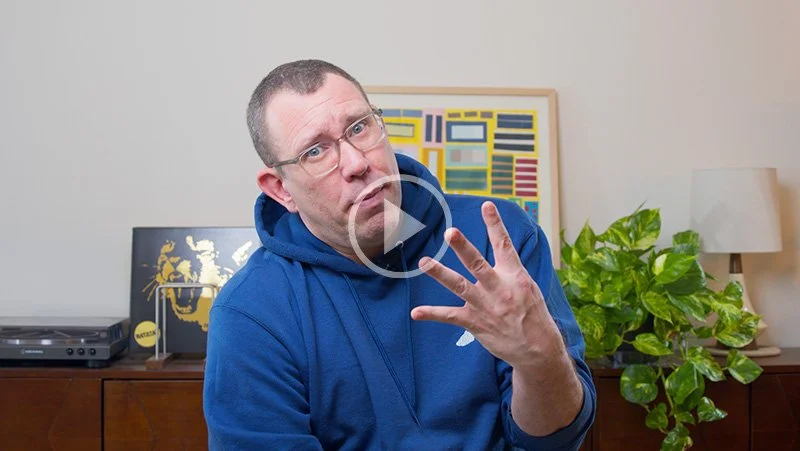Being Unflappable is a Leadership Superpower
Welcome to the #culturedrop. Every Tuesday, Galen Emanuele emails tools to advance leadership skills, team culture, and personal growth. No spam, just great content. Sign up now to get it in your inbox.
Being unflappable as a leader is a superpower.
This week’s Culture Drop is a topic that’s crucial for leaders — and for anyone that has human relationships of all kinds. This post is about being unflappable. AKA, the art of staying calm, composed, and in control, no matter what life throws at you.
This takes a LOT of practice and isn’t something you master overnight, and it’s massively important. Being unflappable builds trust. It creates psychological safety, strengthens relationships, and adds to your credibility and reputation in moments of uncertainty. Here are four critical areas that I think staying unflappable is game-changing.
“Being unflappable builds trust. It creates psychological safety, strengthens relationships, and adds to your credibility and reputation in moments of uncertainty.”
1) Receiving feedback.
How you respond to feedback — good and bad, and especially the harsh kind — matters more than what’s being said.
To be the kind of leader, friend, person that can receive feedback well is top tier emotional intelligence.
The pinnacle of this looks like staying calm, not becoming defensive, and remaining even-keeled is clutch. No matter the feedback to come from a curious, open place of being willing to listen and engage with an “Okay, let’s talk about that.”
By listening with openness and not reacting emotionally, you show that you value honesty, and that you are a safe person to share real feedback with — which is monumental in establishing and building trust. When you react poorly, you lose the trust of the person brave enough to share their perspective.
When you stay unflappable, you encourage more authentic conversations, which are the foundation of healthier, more productive teams and relationships.
2) Managing a crisis.
“If you stay calm, you become the anchor for other people’s emotions, and how they react as well.”
Leadership during a crisis is similar to being the captain of a ship during a storm. If you panic, everyone on board will panic. If you stay calm, you become the anchor for other people’s emotions, and how they react as well. This gives you and the entire team a way better chance to come out the other side unscathed from whatever challenge you’re facing.
Whether it’s an unexpected project meltdown, a team conflict, or a major business setback, the key is to assess the situation, communicate clearly, and take action moving forward in the best way possible.
People look to leaders for stability, especially in chaotic times. Your ability to remain composed reassures everyone that you’ve got this — and that they can trust you to steer the ship to safety.
3) Navigating change.
Change is inevitable, whether it’s a new process, a team restructure, or external circumstances beyond your control. As a leader, you often don’t always have all the answers, and your response and demeanor sets the tone for how others handle the uncertainty.
“As a leader, you often don’t always have all the answers, but your response and demeanor sets the tone for how others handle the uncertainty.”
Being unflappable in the face of change means accepting the reality of the situation, focusing on what you can control, and moving forward with confidence based on the best information and direction you’ve got. Even if you don’t have the full picture, your steady presence helps others adapt and thrive amidst the unknown.
4) Supporting vulnerability.
There’s a unique power in being unflappable when someone is vulnerable with you. It might be a teammate sharing their struggles, a friend opening up about their fears, or a partner revealing something deeply personal.
In these moments, your job isn’t to fix, judge, or react dramatically. Instead, listen with empathy and create a safe space for the other person to simply be seen and heard. Remember, their courage to be vulnerable is a gift and an offer that demonstrates their trust for you. Your calm, compassionate response will reinforce and strengthen that — reacting poorly or making them regret telling you will do just the opposite and can permanently damage a relationship.
“There’s a unique power in being unflappable when someone is vulnerable with you.”
Final thoughts.
In my work with leaders and teams, I have seen many situations made worse by leaders or colleagues reacting poorly to either another person, or a situation. Blowing up, adding to the chaos, not reading the room and having situational awareness of how to respond and proceed is always destructive,
The practice of being able to remain unflappable is very near top notch when it comes to tools in your tool belt that will make you and others around you more successful at navigating the mess of the world.
Related Blogs:
Build Trust & Relationships With This Brilliant Phrase
Want more?
This article was created by Galen Emanuele for the #culturedrop. Free leadership and team culture content in less than 5 minutes a week. Check out the rest of this month's content and subscribe to the Culture Drop at https://bit.ly/culturedrop








